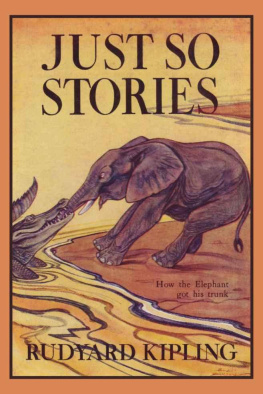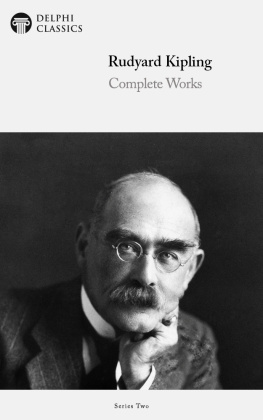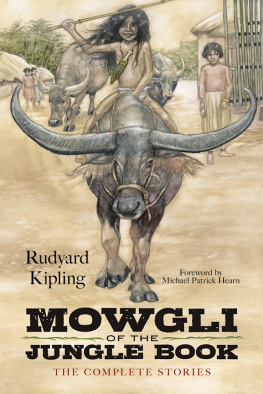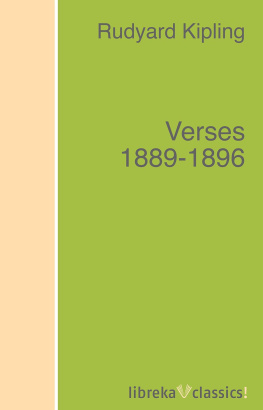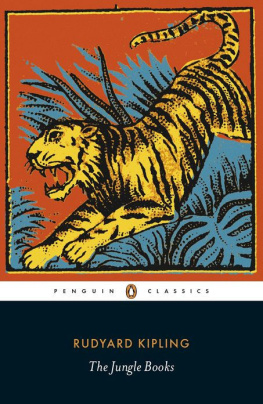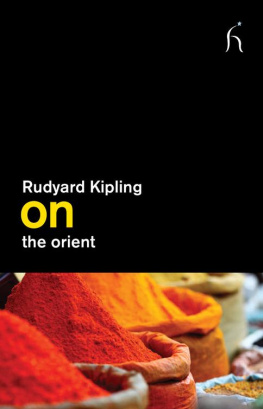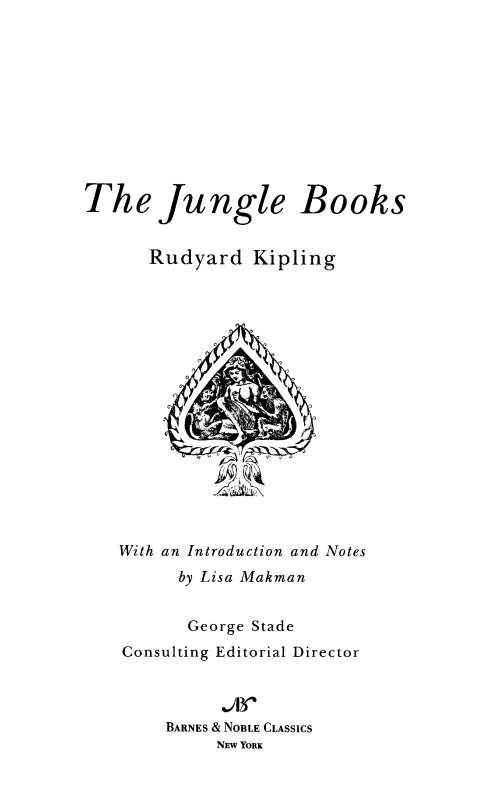
Table of Contents
From the Pages of The Jungle Books
THE JUNGLE BOOK
By thy very carelessness they know that thou art a man.
(from Mowglis Brothers, page 19)
The Jungle is large and the Cub he is small. Let him think and be still.
(from Kaas Hunting, page 30)
We be of one blood, ye and I.
(from Kaas Hunting, page 33)
Here we go in a flung festoon, Half-way up to the jealous moon! Dont you envy our pranceful bands? Dont you wish you had extra hands? Wouldnt you like if your tails weresoCurved in the shape of a Cupids bow? Now youre angry, butnever mind, Brother, thy tail hangs down behind!
(from Road-Song of the Bandar-Log, page 56)
No cradle is so comfortable as the long, rocking swell of the Pacific.
(from The White Seal, page 86)
It is the hardest thing in the world to frighten a mongoose, because he is eaten up from nose to tail with curiosity.
(from Rikki-Tikki-Tavi page 106)
When a snake misses its stroke, it never says anything or gives any sign of what it means to do next.
(from Rikki-Tikki-Tavi page 111)
Anybody can be forgiven for being scared in the night.
(from Her Majestys Servants, page 155)
THE SECOND JUNGLE BOOK
The Law of the Junglewhich is by far the oldest law in the worldhas arranged for almost every kind of accident that may befall the Jungle People, till now its code is as perfect as time and custom can make it.
(from How Fear Came, page 177)
They came back with the news that in a cave in the Jungle sat Fear, and that he had no hair, and went upon his hind legs. Then we of the Jungle followed the herd till we came to that cave, and Fear stood at the mouth of it, and he was, as the buffaloes had said, hairless, and he walked upon his hinder legs. When he saw us he cried out, and his voice filled us with the fear that we have now of that voice when we hear it, and we ran away, tramping upon and tearing each other because we were afraid. (from How Fear Came, page 187)
The strength of the Pack is the Wolf, and the strength of the Wolf is the Pack. (from The Law of the Jungle, page 193)
Mowgli, his head on Mother Wolfs side, smiled contentedly, and said that, for his own part, he never wished to see, or hear, or smell Man again. (from Letting in the Jungle, page 218)
To hear is one thing; to know is another.
(from The Undertakers, page 251)
What more can I wish? I have the Jungle, and the favor of the Jungle! Is there more anywhere between sunrise and sunset?
(from The Kings Ankus, page 278)
He had the good conscience that comes from paying debts; all the Jungle was his friend, and just a little afraid of him.
(from Red Dog, page 325)
Man goes to Man at the last.
(from The Spring Running, page 369)
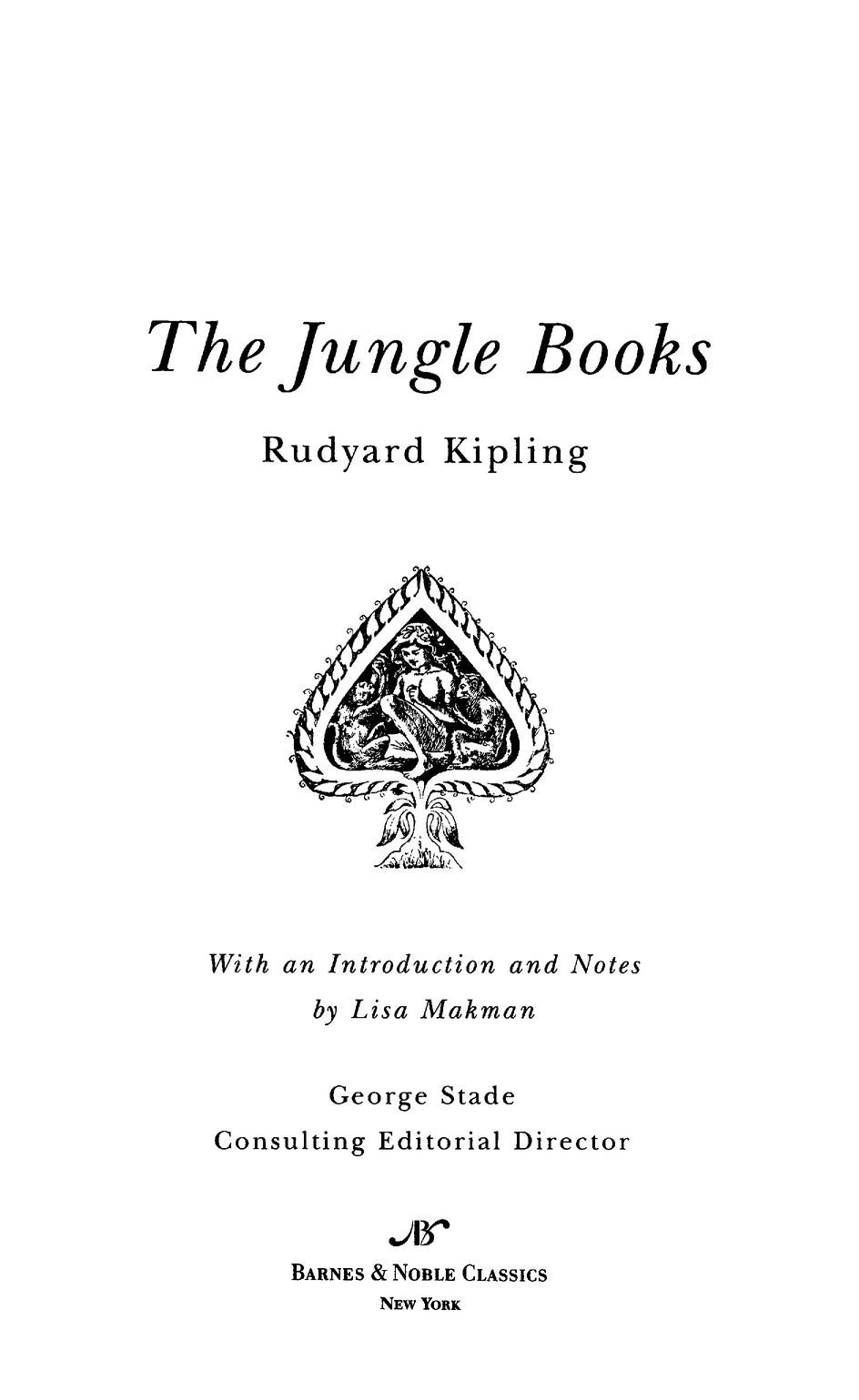
Rudyard Kipling
Joseph Rudyard Kipling was born on December 30, 1865, in Bombay, India, to a prominent couple. In 1871 Rudyard and his sister, Alice, were sent to England to live under the foster care of the Holloway family in Southsea. During six years there, the young boy was the subject of frequent physical and emotional abuse, an experience that left him deeply scarred. In 1878, at age twelve, he enrolled at the United Services College in Devon, where he remained for four years. At school he discovered his love of literature and began to write, taking Edgar Allan Poe as his primary model. His first work, Schoolboy Lyrics, was published in 1881.
Kipling returned to India in 1882 and began working at a Lahore newspaper, the Civil and Military Gazette, followed by a three-year stint at another paper, the Pioneer, in Allahabad. At a time when British expansionism was near its zenith, Kipling began writing stories about Western colonization. His volume of poems Departmental Ditties was published in 1886, and in 1888 several collections of Indian stories, including Plain Tales from the Hills and his six-volume Indian Railway Library series, appeared, bringing him immense popularity. Returning to England in 1889 by way of Burma, Malaya, Singapore, Hong Kong, Japan, and America, Kipling attained literary celebrity, though he suffered a nervous breakdown in 1890. After recovering he published a novel, The Light That Failed, and a collection of stories, Lifes Handicap.
In 1892 Kipling married an American, Caroline Balestier, the sister of his friend and agent Wolcott Balestier, with whom he collaborated on a second novel, The Naulahka, published that same year. Barrack-Room Ballads also appeared in 1892. The Kiplings settled in Brattleboro, Vermont, where their daughters, Josephine and Elsie, were born. There Kipling wrote Many Inventions (1893) and the two Jungle Books (1894 and 1895), and began working on Kim. After a violent argument with his brother-in-law, Kipling returned to England in 1896 and settled on the Sussex coast in 1897, the year his son, John, was born and Kiplings novel Captains Courageous was published. Two years later Kipling became seriously ill with pneumonia, and his daughter Josephine died, yet he brought out Stalky & Co. and a travel book, From Sea to Sea.
Kim was published in 1901, and the following year Kipling moved to Burwash, Sussex, where he produced his childrens books Just So Stories (1902) and Puck of Pooks Hill (1906). In 1907 he became the first English writer to be awarded the Nobel Prize for Literature. In 1915 Kiplings son, John, was killed in battle during World War I. Haunted by this event and in declining health, Kipling nonetheless continued to write.
George Orwell described Kipling as the prophet of British Imperialism, and his imperialist sentiments were reflected in such poems as The White Mans Burden (1899). These convictions strengthened as he grew older, putting him at an increasing distance from the political and moral realities of the changing world. Later in life Kipling became highly critical of the Liberal government that won control of the British parliament, finding fault with its pacifist policies during World War I and actively supporting an increase in military spending for national defense. He did not live to see the extinction of his imperialist visions. On January 18, 1936, Rudyard Kipling died, shortly before World War II and the subsequent decline of the British Empire. His autobiography, Something of Myself, was published posthumously.
The World of Rudyard Kipling and The Jungle Books
| 1775 | The thirteen American colonies rebel against British rule, in a revolution that will last until 1783. Through out the late eighteenth and the nineteenth centuries, the British Empire gains more territory, including parts of Africa, Asia, the Caribbean, and India. |
| 1837- 1838 | Oliver Twist, by Charles Dickens, is published; the title character is generally considered the first child hero in the British novel. |
| 1857- 1858 | The Indian Mutiny takes place, a bid for independence from British rule. The British East India Company, in corporated in 1600 to exploit trade, has long since evolved into an agent of British imperialism. The rebel lion results in the companys dissolution, and in 1858 the British government assumes direct rule of India, ending the Moghul Empire and beginning the British Raj. The British Empire expands to the Mediterranean and the Persian Gulf in the west and to the Malay states, Hong Kong, and Shanghai in the east. |





